The Early Days of My Depression Story and How Crochet Came to Help
Excerpt from Crochet Saved My Life that tells you about how I came to understand the signs of depression after the fact ...
This is an excerpt from my book Crochet Saved My Life, written over a decade ago. I would phrase things differently now, but nevertheless it gives a good portrayal of some of the background of my own depression story. Since I ask so many other people to share their mental health and creativity journeys through interviews here, I thought it might be nice for those of you who haven’t known me since this earlier work to get a glimpse into mine.
Support all of my work with a subscription:
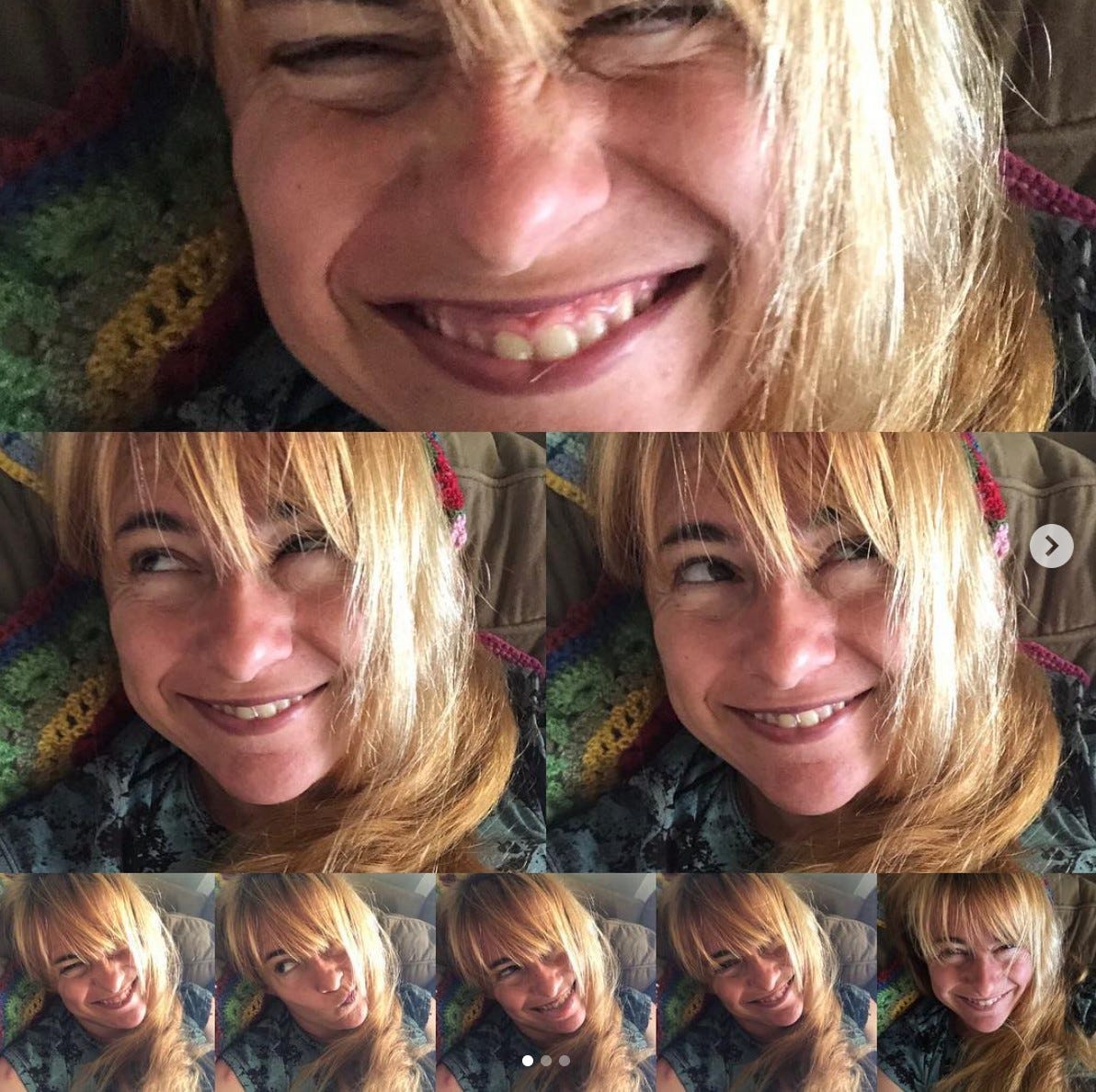
Depressed? Me? No way.
I had read the books. I knew the stories. You see; the very best and very worst thing about me is that I have always been a voracious reader. I have often been overexposed to ideas when I was too young in my own experience to fully understand them. I have often over-thought my own feelings and experiences because of all that I read that related to them. As a result, I had a lot of opinions and ideas on what depression was and what it meant and how to deal with it, opinions that were based on what I thought and not on my real experience of the world. Because my teenage bookshelf was cluttered with the dangerous minds of every depressed woman from Sylvia Plath to Elizabeth Wurtzel (as well as the thoughts of many men about these women) I had a comprehensive picture of the experience of depression. And while I felt like some of the details of the depressed experience resonated within me, I didn’t feel like it all fit into a neat label of depression. What I didn’t realize then was that my story wasn’t complete … and therefore it couldn’t be told like a story, couldn’t be read like a story, couldn’t mirror these women’s lives completely because it was human experience and not just a chapter-by-chapter account of who I was.
What I am trying to say is that I denied being depressed, or truly depressed, or depressed in a way that could be solved by medication, or depressed in a way I couldn’t control myself, or suicidally depressed … I denied it vehemently and I denied it quietly and I denied it for about fifteen years.
Today I can look back through the tunnel of depression from the other side. From here, I can see that my first obvious battle with depression began when I was 14. What you will learn about me as I continue on with my personal story is that I often dealt with, acted out and ultimately worsened my depression in direct relationship to the man in my life at the time. It is a classic story for women dealing with depression but obviously I didn’t see it as such at the time. I’ll foreshadow the future of my story by saying that there’s a lot of strength in being a girl alone with a crochet hook instead of a girl alone in someone else’s bed.
At 14, I did not know how to crochet and I did not know that trying to solve your own problems by loving someone else would only make you feel more alone. What I knew was that I was living inside of a terror-filled situation and I didn’t know if things were worse in the external halls of my junior high school or the internal halls of my increasingly unhappy mind. I’ll save the details of my middle school unhappiness for another time and place. Suffice to say that the accounts of bullying that I read about in the news today make my stomach turn, not because I can relate to those stories but because the supposedly lurid details of those stories seem so pale and soft and simple in comparison to what I went through that I am sick with envy for people who had such a mild experience of life in middle school.
Take the frightening daily experience of a tortured junior high school existence, add some discontent in the home, pour on a little bit of normal teenage hormones and then strike a match and what you have is the perfect mixture for a mind probably already prone to depression to enter its first serious experience of the condition. So I did what I would do for the next dozen years: I lost myself in the reflection of my soul seen in the eyes of an even-more lost boy.
As you’ll see, it wasn’t only boys I turned to when I needed to escape the depression in my mind. In addition to boys I found suitable chaos in codependent friendships, attempting to parent my own siblings, taking on increasingly stressful jobs, moving to new places, exploring a diverse array of random interests in occasionally sketchy settings and essentially doing whatever I needed to do to get outside of my own head. It is as if the depression was an itch inside of my head and the only way to scratch it was to find something outside of myself that was even itchier. I’m not sure quite why this worked for me. Maybe what I needed was for the crazy pain inside of my own head to be externalized in front of me in the form of something else so that I could tangibly deal with it. Maybe I desperately needed a distraction loud enough to quiet my own thoughts. Maybe taking care of someone or something else made me feel competent in a way that I couldn’t when I was just doing nothing, just being. I’m not sure. What I know is that it worked and the first time I really saw that it worked came during middle school.
So that’s why at 14 I was deeply immersed in a chaotic relationship with a drug-selling gang member that I was initially attracted to because he “looked like a lost puppy” (according to my seventh grade journal). That is not the best way to start a relationship. It is, however, an ideal way to escape the prison of crazy depression in your own mind because instead those feelings are mirrored by someone else and acted out in a space external to yourself.
This boyfriend and I shared turbulent feelings about the pointlessness of life. He was suicidal. I should admit that almost everyone I was friends with at this point was either actively suicidal or passively suicidal (by which I mean that they were extremely unhappy and engaged in very reckless behavior with a high likelihood of death). It is shocking to me to look back and see that none of us actually died. The love of my fourteen-year-old life fell squarely into the actively suicidal category. I remember that he would call me in the middle of the night, telling me that he had just cut his wrists and was bleeding onto the kitchen floor. I remember being in my own kitchen at the time, a 2am teenager back in the days when phones all had cords and you talked in family spaces.
Sometimes my dad would get up, come into the kitchen for some water, and tell me to go to bed although I don’t remember him ever actually doing anything that indicated that he meant it. I also don’t remember ever feeling like I should tell him that there was a boyfriend with slashes up and down his arms on the other end of the line. I do remember thinking that this was my boyfriend who needed me and it was my job to make sure that he didn’t die on the kitchen floor while I paced my own similar kitchen floor across town. And so I took it upon myself to try to convince this man-child to stop the bleeding, to bandage up his arms, to get help, to let me love him completely until he was okay.
And here is where it happened, where I first showed those initial signs of being astoundingly skilled at locating, latching on to and loving men who were far more obviously depressed than I was. As a result, I didn’t feel like I really had that much of a problem. I was functional. I was fine. Never mind that I cried every night with worry about that boyfriend. Never mind that my best friend and I talked frequently about the possibility of suicide and that the only reason that I didn’t consider it more seriously was because I felt an obligation to take care of my younger siblings as we grew up in our own chaotic household. Never mind that I engaged in seriously risky behavior like unprotected teenage sex and walking alone in questionably revealing clothes in dangerous areas of town. In comparison to the frenzied, aggressive depression of this person I was obsessed with, this boy who had gunshot holes in his front door, parents with lines of cocaine on broken mirrors in the next room and a knife pressed against a large vein in his arm, I really wasn’t depressed at all.
Until I was of course. The thing that you need to know about depression is that if it is ignored, it gets bigger and bigger. It grows monstrous. And it always wins. It will get your attention no matter how insanely time-consuming your obsession with other things is. I could focus my depression outward into caring for the boyfriend bleeding on his kitchen floor, the siblings starting to get into neighborhood trouble, the best friend who became pregnant and didn’t tell her parents until she was eight months along but in the end the depression demanded more attention than they did. Something in me knew that I desperately needed to deal with my own self because there was a downward spiral happening. Oh how I wish I knew then about the healing wonder of stitching a million single crochets until an afghan of comforting safety grew around you.
The thing about my youthful depression was that I could always pull myself out of it with a change. I could tell myself that the problem was the external craziness and if I changed the circumstances around me then I would not be unhappy anymore. To an extent, this seemed true. When things are so desperate around you and then you stop the desperateness, life feels calm and okay for a moment despite the problems inside your own brain. So I broke up with that boyfriend and I started a new school and met people who weren’t constantly figuring out the best way to die … and for awhile I was okay. I would even say that I was happy.
But depression never left me far behind. It was there at 16 when I was screaming and clinging on to a different boyfriend, sobbing every day and blaming him for my unhappiness. Depression again gave me a brief reprieve after that breakup when I was enjoying new friendships, but it was there at 18 when I dropped out of high school, citing numerous well-thought-out arguments against the institution of education but really just not capable of waking up each day and going to that place and sitting still while people talked because my head was raging too loud with unhappiness and I just wanted to stay in bed all day and read dark poetry.
When I dropped out of high school, I worked at a bookstore and I started taking massage therapy classes and I was okay for awhile, again. When the depression itched a little, I amped up the drama in an intense friendship I had or immersed myself in a brief fling that was dramatic enough to take my mind off of my own mind. The series of boys that I distracted myself with during this time included a brooding writer who fueled his poetry with vodka, a few guys going through intense conflicts with religious issues, and a women’s studies major that my journal reminds me I did not have sex with because he only had sex with lesbians. Wait, what is that, is my life getting so quiet that I can actually hear the chemical pain inside my own brain? I had better go ahead and start dating my friend’s little brother while also having a secret fling with her on-again-off-again boyfriend of sorts. Okay there, my problems have been externalized so that I don’t have to cope with the depression inside.
But of course, depression crept back in despite these valiant efforts. So I changed my circumstances, again. I started a job traveling around the state doing photography. And I was okay again, for awhile. Until I suddenly found myself curled in a ball on my bed, ignoring the phone and the door because the ever-present companion of depression made me want to hide from everyone else. So I got a new job at a trophy shop and that change was okay for a little while.
Until it wasn’t. One day in the midst of my brain starting to itch again a super attractive man walked into the trophy shop. By super attractive I don’t mean that he was objectively good looking. I mean that my brain somehow knew instantly that this character was definitely trouble enough to distract me from my own depression. I took him home with me and he never left. That is to say that he never left until a few months later when he was arrested after robbing several of my neighbors. I was depressed enough at this point that I think the very idea of being alone inside of my own mind was so incredibly terrifying that instead of breaking things off at that point I visited him regularly at the prison and immersed myself in the drama of being a sort-of-girlfriend to an inmate. Yes, I knew that I didn’t want to be nineteen and spending my weekends in a prison. But I was coping. If I could back in time I would march my teenage self straight to a yarn store and load her arms with skeins of cashmerino, silk bamboo and baby alpaca fibers. I would give her hooks made of aluminum and plastic and wood and even glass. I would explain that the real prison was in the mind and that a stitch or two could begin to break down the barriers.
But I did not have crochet then. All I had was a suspicion that yet another change of scenery was required. I started back to college and was okay for awhile, again … until I wasn’t. The next few months were a doozy of trying to drown myself in the drama of others in order to escape my own depression. There was escalation in the drama between my then-best-friend and I, an even greater chasm of chaos opening up in the dysfunctional relationship we’d already been carrying on for years. It didn’t help that she ended up sleeping with an acid-tripping musician friend of mine who had a serious crush on me and in this weird twist of complicated relationships I didn’t mind the situation since I didn’t like him but she was angry at me because she regretted sleeping with him. It also didn’t help that I was secretly sleeping with her sixteen-year-old brother who had a girlfriend at the time. Oh boy how I wish I knew about anti-depressants and crochet at this point in my life. I would say a nice and pleasant “let’s part ways” to that friend, get out of her brother’s bed, take my Celexa, make an extra appointment with my therapist and then make granny squares in every color of the rainbow.
But I didn’t know to do those things. What I knew was that even all of this crazy-making drama was not quite enough to scratch the intensifying itch of my troubled brain. So when I met a seventeen-year-old runaway with the worst drug habit of anyone I’d ever known I clearly thought that the best solution to my life was to have him move in with me. This was not a conscious thought mind you. The conscious thought was more along the lines of, “gee he’s cute in this lost puppy dog kind of way”.
I didn’t do any drugs myself. I didn’t even drink socially at the time. Sometimes I wished I did because let me tell you that an out-of-control teenager with a drug habit can wreak considerable havoc on an otherwise sober home. I wished that I did do drugs to have a viable mental escape from dealing with things. Things like the time that I came home and found him having sex with a half-passed-out fifteen-year-old girl in my living room. Or the time I returned from an out-of-town trip exhausted but could not crawl in between the sheets of my bed because the kid had robbed my entire house including the sheets on the bed. It is hard to even think about the fact that you might have a problem inside of your own brain when you have someone like this as a glaring example of what life is like when you have “real” problems.
I needed more distraction. I needed a change. So when I met a man who was quitting his job to live in his car and bum around the country I instantly fell into a haze I thought was love. I officially dropped out of college, sold most of what I owned and ran away with this man I’d just met. We put a camper shell on my pickup truck and hit the road, each trying to outpace our own depression by leaving it a state line behind. The change of scenery helped a little bit. I felt happy sometimes. But don’t worry. When the itch in my brain threatened to twitch I could always focus on the fact that he occasionally did things like pull over at a rest stop, stare off into space and say, “sometimes I just go to dark places” or listen intently when he would angrily talk about all of the ways he’d been wronged by the bisexual strippers he’d dated in the past. Don’t worry; he was still a little more sick than I was.
By this time I was 21, more than half a dozen years into my depression, and the distractions were clearly helping less and less. This new man and I fought constantly, made up energetically and then fought more violently. Only later would I realize that the significant problem in our relationship wasn’t anything that we ever actually fought about but rather simply the fact that we were both incredibly unhappy people wishing desperately for one another to solve that unhappiness. When we ran out of money we moved into my parents’ house, the two of us living together in their living room, and I staggered through another year of depression. I tried a few odd jobs, lasting anywhere from half a shift to two weeks, before I landed a job at a group home helping to care for foster children in need of therapeutic level emotional care.
This was a new level of positioning myself around people who were far worse off than me emotionally. I never did this consciously, of course. I think it was just the best built-in coping mechanism that I had for denying and sublimating my own depression. If I could find people who were unhappier than me and then take care of them then it made me feel happier (for awhile). Or so I thought. In truth I guess I never felt happy but I did feel useful and functional and relatively mentally healthy in comparison to my environment. The problem with using this method of dealing with depression is that eventually there aren’t worse situations. I read once in a memoir about drug addiction that you only get high the first few times and every time after that the drugs just bring you back to “normal” (your new normal). It was like that for me except that my drug was finding people in bad situations to “help”. My suicidal boyfriend at fourteen was my marijuana, the boyfriend in prison was my cocaine, and now if I wanted to get any sort of high I needed to move on to heroin. So I tried.
I did a year of taking care of the kids at that group home job and then went on to work in the sexual abuse unit of Child Protective Services while applying to get my own foster care license and doing mentoring of kids “in the system”. I was a foster parent for two years, holding myself together with the distraction of taking care of other people and being mostly unaware of my own depression. During the same time I launched my own through-the-mail non-profit program supporting arts and writing of incarcerated adults. I was going to save the world and somehow that was going to save myself. I wasn’t depressed, damn it, but if (somehow, possibly, maybe) I was depressed then I was going to win the arm wrestling competition and flatten depression to the table with a million good deeds for others. I was going to get so high on fixing things that I would never have to come down off of that high.
At 25, I burned out. To the outside world it looked like I was simply trying to do too much. I can see how it would look that way, what with the foster kids and the non-profit and the four-year-college degree that I got in two years. But the real issue was entirely different. It was not that what I was doing was too much; it was that all that I was doing simply wasn’t enough. It wasn’t enough to cure the actual problem, which was the depression settling deeper and deeper into my life. I spent the next several months doing almost nothing. I got cable TV for the first time in my life and spent almost every day laying on my couch, eating gummy bears and Red Vines, watching endless pointless shows that I couldn’t remember only days (okay, minutes) after watching them. I hadn’t given up on the possibility of finding a new distraction because I knew I couldn’t keep feeling the way that I was feeling. And yet, it was hard to think of any distraction that might work and most of what I tried rapidly proved itself inefficient against the darkness of my mind. Working with an artist at anime conventions. Doing more traveling. Trying to write a book. I started these things with urgent desire and quickly the enthusiasm faded. This is another time in my life when I could have used the hook – a nice middle-of-the-range G hook and some basic cotton yarn just to teach me that a normal, calm, non-dramatic, run of the mill life could be the best kind of life.
I did not have a hook … so I had to make another change. That’s when I decided to move to San Francisco. I had fallen in love with the city on my first trip there when I was eighteen. I made up a reason to move there … telling myself that I was going to go to law school. I applied and got in and moved and started law school. The change of scenery helped for awhile (again) although I quickly realized I hated law school and dropped out to pursue writing (a job I’d been doing off and on for my entire adult life anyway). Moving to San Francisco was the best thing that I ever did for myself. It is a place where I feel creative and healthy and alive. But even this grand change couldn’t stave off the depression for long because by this time I’d been fighting it off for more than ten years and I was getting weaker in the battle.
I’m sure you have heard the stories of someone trapped in the wild beneath a tree that has to cut off his own leg with a dull knife in order to get out and get to safety. Depression is not a limb that you can excise in order to start feeling better. If it were, I would have cut it off by this point, at any cost. But depression is an organ, stuck inside of you even when it is so unhealthy that it not only doesn’t work properly but actually becomes toxic inside of you. Depression weakened my ability to function like a cancer weakens the body, like a flesh-eating bacteria spreads across the subcutaneous layer leaving holes in its wake and weakening the structure of the entire body.
All along I knew that I needed to find a support system and find some activities that I could enjoy. I tried. I have had Sunday dinners off and on at my home since my early twenties, trying to forge a family out of friends in ways that often didn’t work. I have joined groups of all kinds. I have taken burlesque dance classes and art therapy classes and small business classes. I have met more people than I could ever possibly remember, trying to connect to others and to feel alive, to feel like I might actually want to be alive, for more than just a brief period. I promise you, I tried.
I share all of this (abbreviated) back story so that you can understand that by the time I reached the stage of depression that required the assistance of crochet, I had been through a lot. I had distracted myself from the torment of my own mind in every single way that I could think of doing. And still, the depression crept up on me and took over my entire life before I exactly knew what was happening. Somehow I found myself at 28 feeling entirely alone in the world despite having people I could call in the middle of the night if I needed to. I found myself feeling one hundred percent convinced that I would never find any activity or education or pursuit remotely interesting ever again. I found myself glued to my bed watching every episode of all twenty years of Law and Order over and over again because I could no longer leave my room. I found myself with such social anxiety that I often stood up even my closest friends. I recall one time when I agreed to go to dinner with a friend because I knew that I needed to be social but when he showed up I turned off the lights and ignored the door. He persistently stood outside for a long time, alternately ringing the doorbell and throwing pennies at my window, until he finally gave up and went away and I felt guilty relief, muted because all feelings are muted when you are depressed.
I found myself regularly in tears, showering three or four times per day because it seemed to be the only thing that stopped the sobbing for even a brief time. I still made occasional efforts to find a way to escape the depression yet again. This included efforts to do productive things like start new jobs as well as the familiar stand-by of negative efforts involving strange boys with puppy dog eyes. But these efforts were weak and failed. Finally I told my sister that she should come spend the summer with me. I thought the closeness and company and activity would be good for me, would “snap me out of it” again, for awhile.
But it couldn’t save me despite how much we tried. I dragged myself out of bed, convinced that going to the beach with her would be a good idea. But the very process of trying to use my car share program, getting a car I wasn’t familiar with, having to fill up the gas tank, navigating the traffic … it was all too much and set me off into uncontrollable tears. I just wanted desperately to not have to wake up every day to keep dealing with this existence. I started really thinking actively about suicide for the first time in my life. And finally I mustered what I think might have been the last gasp effort I had in me and said, “I need help”. I had my sister call my best friend (my real, ongoing best friend, not the “best friend” of the drama from years before) and he spent copious amounts of time with me while I tried to figure out how to find a therapist and how to get on medication and how to navigate the health care system. To this day I don’t know where I got that puff of energy required to deal with these things. And although I won’t jump on my high horse about the mental health system, I will say that even with health insurance and money enough to pay the bills, it is extremely, extremely difficult to find good mental health services especially when you need them most.
I met a psychologist and a psychiatrist, got a diagnosis of double depression, agreed to try an antidepressant, threw myself into talking about what was wrong and tried to make things better. I didn’t believe that it was going to help but I didn’t know what else to do. Dragging myself to the appointments with these professionals took absolutely all of my energy. There was nothing left. The rest of every day was just stuck in my apartment, crying. My sister had spent several months with me and needed to go back home. I was lonely but relieved because even having someone else in the same room as me was exhausting. She would breathe and hearing the respiration would tire me out.
And still a voice nagged that I had to find a distraction, an activity that I could enjoy. I knew that I was supposed to do what was in my heart but the idea just angered me because I couldn’t hear my heart. I honestly didn’t think I would find any pleasure in anything. But I remembered a piece of advice from one of those many books that I had read – to go back to what you enjoyed doing in childhood. I remembered spending hours making friendship bracelets and somehow that led to a memory of my mom teaching me to crochet and I latched on to that and decided to try again because it was something I could do alone in my house in my pajamas with the TV droning on.
I wish crochet had immediately solved all of my problems but of course it didn’t happen that way. What did happen was that crochet slowly became a positive replacement for some of my most destructive downtime. The thing is, even though I now finally had a therapist and a medication plan, I would still often find myself in the middle of the night crying on my bathroom floor, terrible sobs wracking my body. I was getting better but I didn’t know it at the time. Because you see, getting better for me meant that I needed to finally deal with my own mind instead of going outside of it. And that did not feel better when I first started the process. On more than one occasion I found myself eyeing the vodka bottle and the pills I had, wondering if I had enough poison there to do myself in. I wrote goodbye letters to my family members although it will probably horrify them to read that since I didn’t tell anyone about them at the time. And I sat crying on that bathroom floor with a knife pressed against my flesh … until I would come to my feeble senses and realize that I needed to put the knife down and replace the empty space where it was with a crochet hook.
It is so difficult to describe the state that I was in. I did not want to die but I most definitely wanted to be dead. I did not see the point to life. All I saw was this endless cycle of having to continue waking up and feeling this horrible way forever. I knew from experience that no matter how much I tried to distract myself with men or friends or activities or social causes or jobs I was going to end up right back here on the bathroom floor with the tip of a kitchen knife poised to go into my arm. I hated hovering in this space. I did not want to kill myself but I wished desperately that I could just force myself to take that step. There were times when I would look at that knife in my hand and will myself to just press down. I never did. I never broke skin.
Looking back I can see that I did not want to die. To be honest, I don’t know why that is. Maybe it is because I have younger siblings and parents and a best friend I’ve known for more than half my life … and enough knowledge of human psychology to know that my death would irrevocably alter their lives. Maybe it is because I have always been a reader of stories and had an insatiable curiosity to know what lies on the next page of my own life tale. Or maybe it is because inside of most people is an instinct not to die.
I did not want to die. I also did not want to live. But somewhere deep inside of me I wanted to want to live. On the surface I was willing myself to just press the tip of that knife down and be done with it already. But deep down beneath that surface there was the spirit of a girl who had been fighting for years to craft a life for herself. The girl who was willing to try new boyfriends, new schools, new jobs, and new cities was still in there hoping that there was some new thing somewhere that would make waking up a joy instead of a burden.
For me, that place of indecisive hovering was the worst place I’d ever been. I did not want to live and I did not want to kill myself. I did not believe that I would ever find a life I didn’t hate and yet I hoped that I would. I sat on that bathroom floor for months poised in between decisions, stuck in a position where a knife tip nearly entered my vein but never did. You can only hover there for so long. You have to choose a direction. I needed to locate yet another final puff of energy somewhere in my body and decide if I was going to use it to press that knife down and end things or drag myself up off of the bathroom floor and put the knife away. In the end, I used the little bit of strength I had left to pry my fingers apart, loosen my grip on the knife handle and put a crochet hook in its place.
That crochet hook became my lifeline. It was my go-to weapon whenever I felt like I needed to pick up another knife or a bottle of vodka or even a pen to write my goodbye letters. I picked up the crochet hook instead. I got books that teach kids how to crochet and I used YouTube videos to learn a few things and I started to make scarf after scarf. I did this at first because I had to, because I had to stop the desperation. It helped me to focus for even a few minutes on pulling a piece of yarn up with my hook to make a loop (and then a chain, and then a scarf). I would still sob but then I would stop sobbing and work on my crochet. The more I crocheted, the less I sobbed. I didn’t know it was going to change my world but I knew that it changed that moment just a little bit.
So the initial phase of how crochet saved my life was very literal. It gave me something to do to prevent suicidal thoughts and actions. It gave me a bit of a distraction from the mess in my head that was making me simply not want to live anymore. But gradually it came to help with my depression in many other ways and for that reason I believe it can be a useful tool for people suffering from any stage or level of depression.
How Crochet Taught Me Gentleness With Myself
I was delighted when I first discovered the @knittingistherapeutic account on Instagram and excited when I realized it was linked to a podcast (Why I Knit) created by a Clinical Psychologist (Dr. Mia Hobbs) who is passionate about the mental health benefits of knitting (and crochet, etc.) When I first did my research for my book, Crochet Saved My Life, over a decade ago, so few people were talking about this topic. Now there’s research, anecdotal evidence, and celebrity stories about the benefits of yarn crafting. I am here for it! So, I was thrilled when Mia reached out to me to inquire as to whether I’d be interested in being on the podcast. Yes, yes I was very interested!
And from there, I went on to begin researching and writing about the mental and physical health benefits of crochet - on a blog, in a magazine column, in this book and the next book and the next book which was part of an awareness-raising art project. Then I began to expand and explore not just art/craft as therapy but also the shadow side of the complex relationship between art and mental health. That’s the work I share here on Substack and the work I hope you’ll be inspired to support me in doing.
If you read this far, perhaps you liked the work. The work does take work. It only continues with support, so please consider subscribing. My annual rate starts at $10 per year.




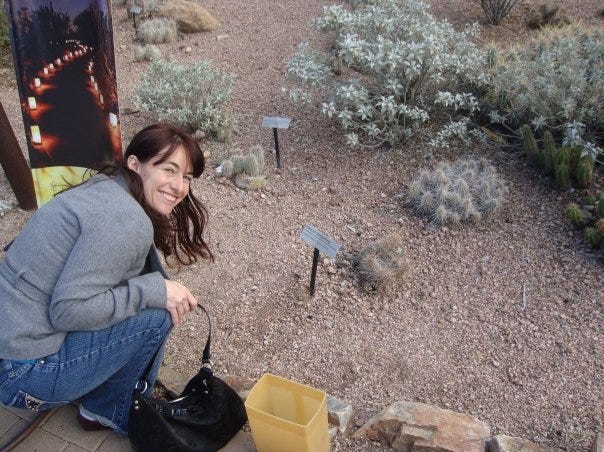

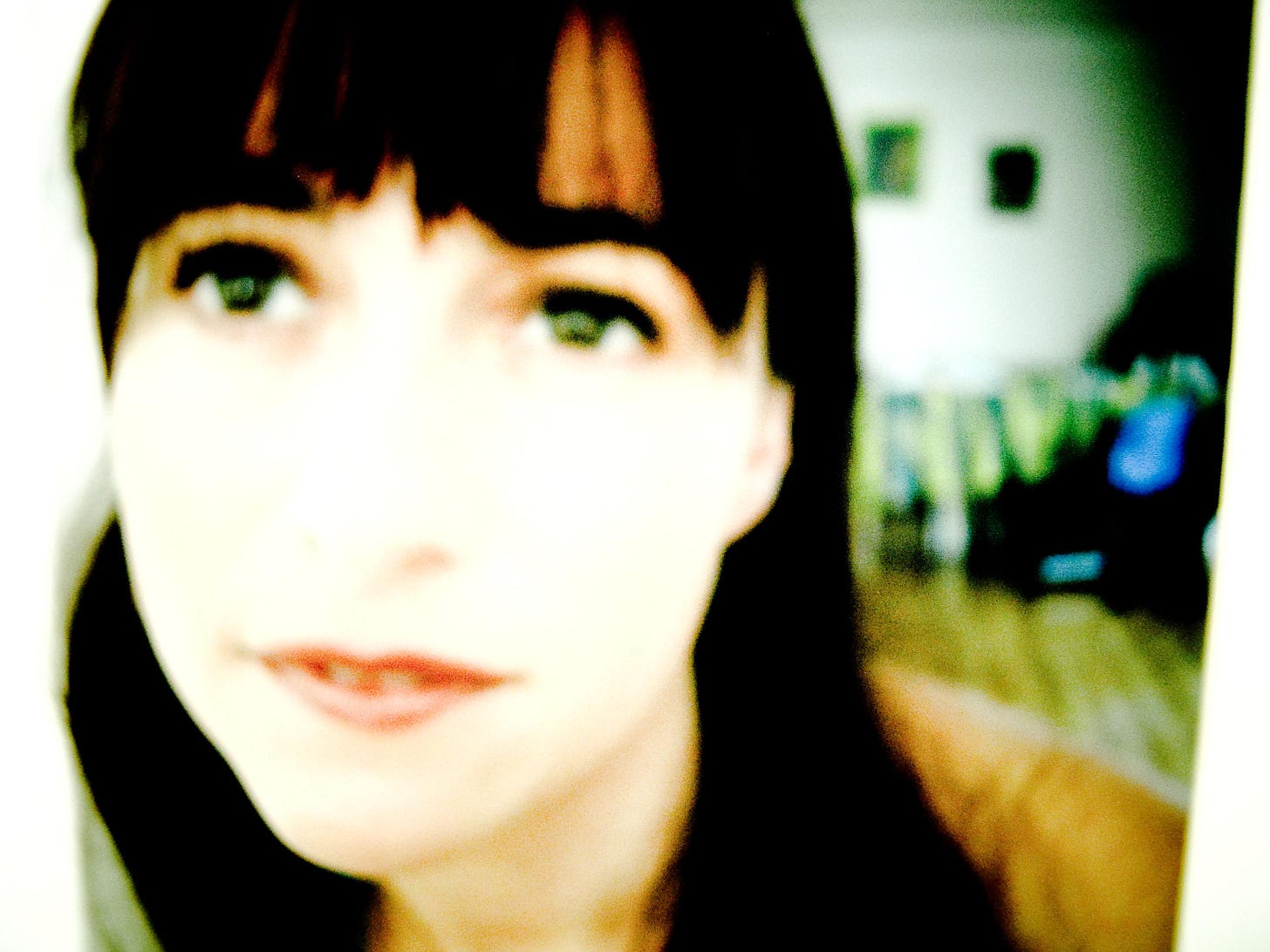
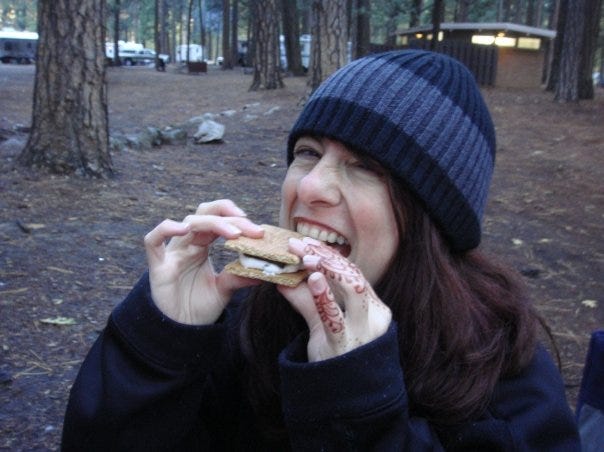
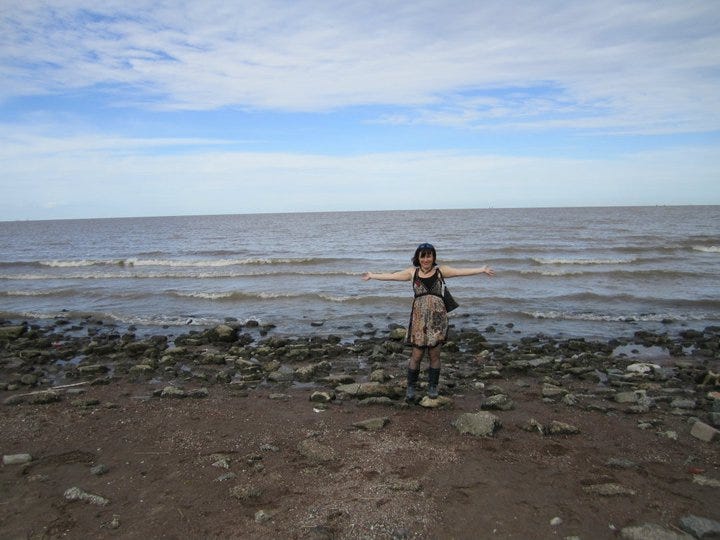
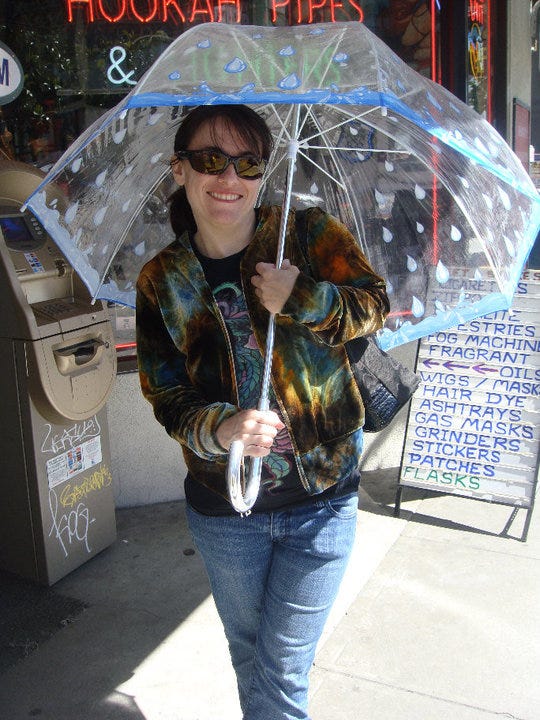

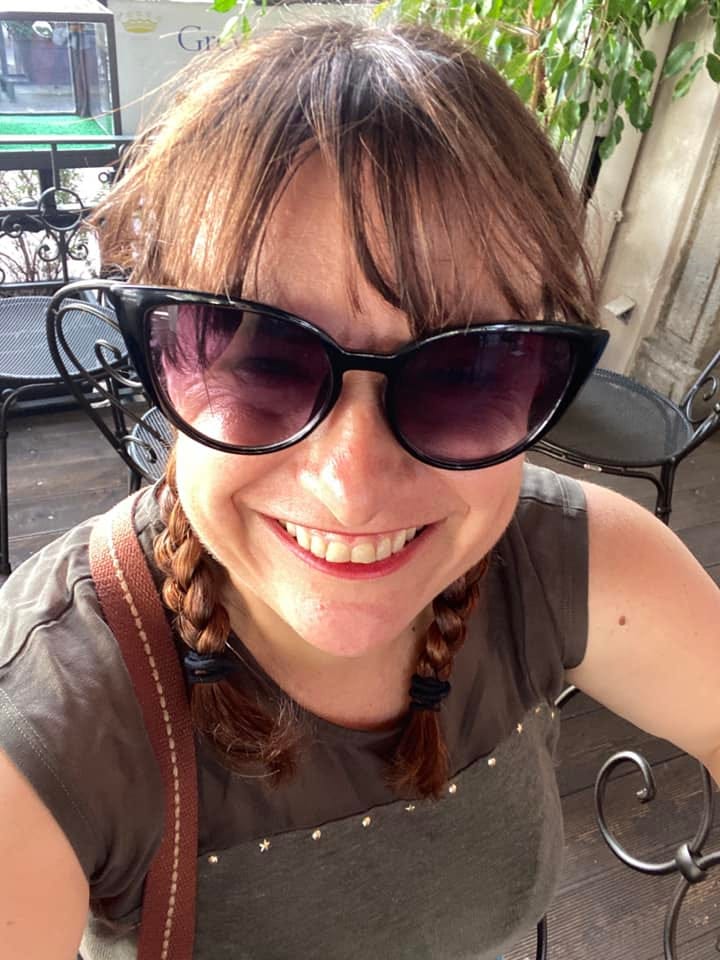
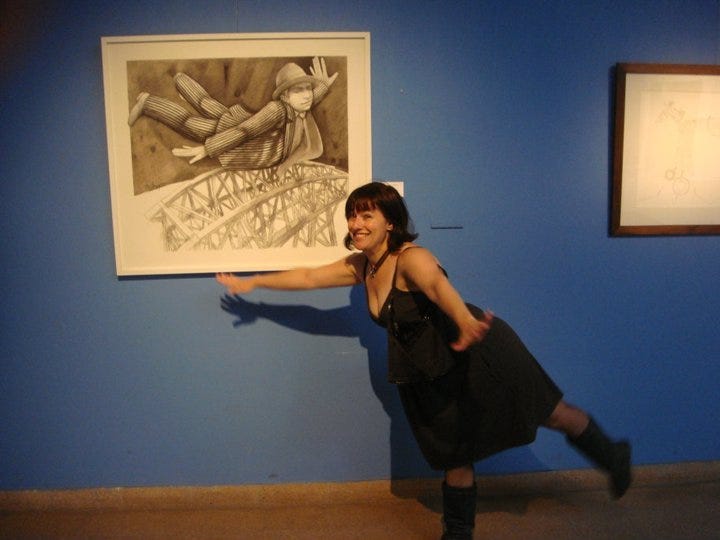
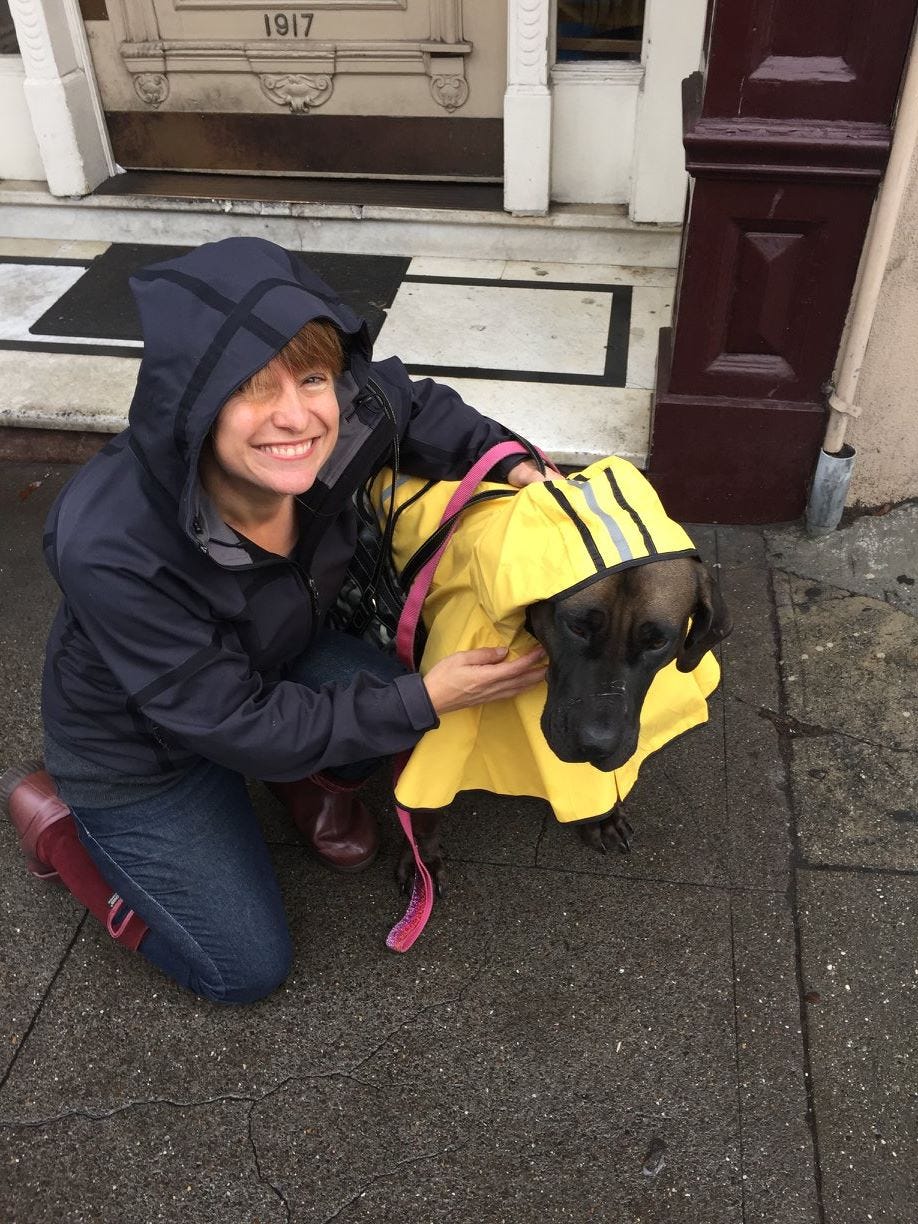
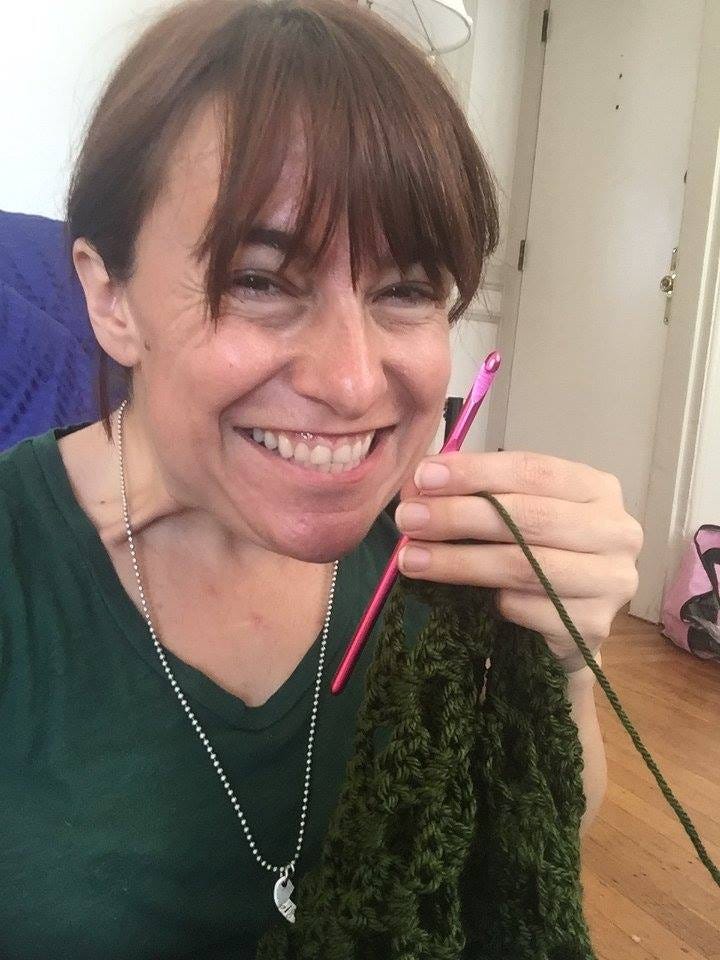
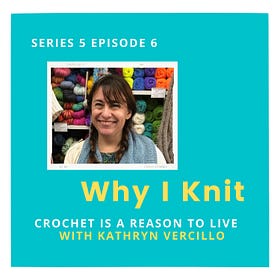
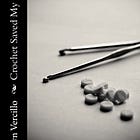

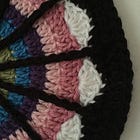
What a read. How did you feel writing it and after sharing it? So much of your story here. Though like you say, the briefer version. I’ve always maintained that journalling saved my life (7 years ago) though I haven’t written about it yet. I feel inspired by you to do so. Thank you🙏🔹
Thank you for sharing your story Kathryn. It takes a lot of courage to look back on those years of denial and acknowledge the presence of depression. It's also significant that you've recognized the influence of relationships on your mental health. Many people can relate to the idea that our personal struggles often intersect with our interpersonal dynamics. It's a reminder that each person's experience with depression is unique, and there's no one-size-fits-all narrative. Your journey resonate with others who have faced similar challenges and help them feel less alone in their struggles.